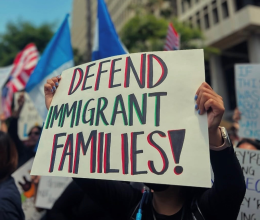Today the U.S. Court of Appeals for the Ninth Circuit issued a landmark ruling that curtails one of the most wasteful and draconian features of our immigration lock-up system: the government's practice of putting immigration detainees behind bars for months or even years, without ever holding a bond hearing to determine if they should be locked up in the first place. In Rodriguez v. Robbins, a class-action lawsuit brought by the ACLU, the Court upheld an order requiring bond hearings for detainees locked up six months or longer while they fight their deportation cases. The ruling stands to benefit thousands of immigration detainees across the Ninth Circuit, where an estimated 25% of immigrant detainees are held every year.
The government's track record makes the importance of this ruling clear. The immigration lock-up system is massive and hugely expensive to American taxpayers. In 2011, the government detained a record-breaking 429,000 immigrants at a price tag of $2 billion, even though most immigrants do not need to be locked up to ensure their appearance for court or protect the public from harm. In many cases, the basic due process of a bond hearing would have prevented months or years of such arbitrary detention and saved countless taxpayer dollars.
One such person is Byron Merida. Byron has lived in the United States for nearly three decades, during which time he started several successful small businesses. All of his immediate family members are U.S. citizens or lawful permanent residents. Nonetheless, the government detained Byron without a bond hearing after it placed him in deportation proceedings following his conviction for a non-violent crime. The government continued to detain Byron while his immigration case wound through the courts, including his successful appeal to the Ninth Circuit. When Byron finally got a bond hearing as a result of our case, the immigration judge ordered him released on a $2,500 bond. In total, the government needlessly detained Byron for three years and four months—at a cost of nearly $200,000 to taxpayers. And Byron is not alone. According to the government, immigration judges have ordered the release on bond of approximately two-thirds of the people given hearings under the lower court's order, making clear that the vast majority of long-term detainees can be released without endangering public safety.
Indeed, the Ninth Circuit specifically rejected the government's claims that we need mass immigration lock-up to keep our streets safe. As the Court held: "Contrary to the government's rhetoric, this injunction will not flood our streets with fearsome criminals seeking to escape the force of American immigration law," but "provides individuals . . . a hearing where a neutral decision-maker can determine whether they might deserve conditional release from the prison-like setting where they might otherwise languish for months or years on end."
As comprehensive immigration reform gears up this week, today's ruling is an important reminder that meaningful reform must include fixing our broken immigration detention system—a system that wastes money, ruins lives, and violates our constitutional values.

